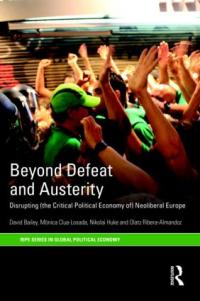David J Bailey, Mònica Clua-Losada, Nikolai Huke, Olatz Ribera-Almandoz (2018): Beyond Defeat and Austerity Disrupting (the Critical Political Economy of) Neoliberal Europe. Routledge.
Much of the critical discussion of the European political economy and the Eurozone crisis has focused upon a sense that solidaristic achievements built up during the post-war period are being continuously unravelled. Whilst there are many reasons to lament the trajectory of change within Europe’s political economy, there are also important developments, trends and processes which have acted to obstruct, hinder and present alternatives to this perceived trajectory of declining social solidarity. These alternatives have tended to be obscured from view, in part as a result of the conceptual approaches adopted within the literature.
Drawing from examples across the EU, this book presents an alternative narrative and explanation for the development of Europe’s political economy and crisis, emphasising the agency of what are typically considered subordinate (and passive) actors. By highlighting patterns of resistance, disobedience and disruption it makes a significant contribution to a literature that has otherwise been more concerned to understand patterns of heightened domination, exploitation, inequality and neoliberal consolidation. It will be of interest to students and scholars alike.
Table of Contents
Introduction
- Beyond Left Melancholy: towards a disruption-oriented account
- The limits of market-based pacification: Labour unrest and European integration
- In search of a new radicalism? Workers and trade unions during the European crisis
- Resisting neoliberal Europe, responding to the dismantling of welfare states
- Defending the common: struggles against marketization and austerity in education
- Everyday endeavours towards a needs-based housing policy
- Trapped between authoritarian constitutionalism, pragmatic prefigurative movements and Brexit? Disrupting neoliberal Europe

